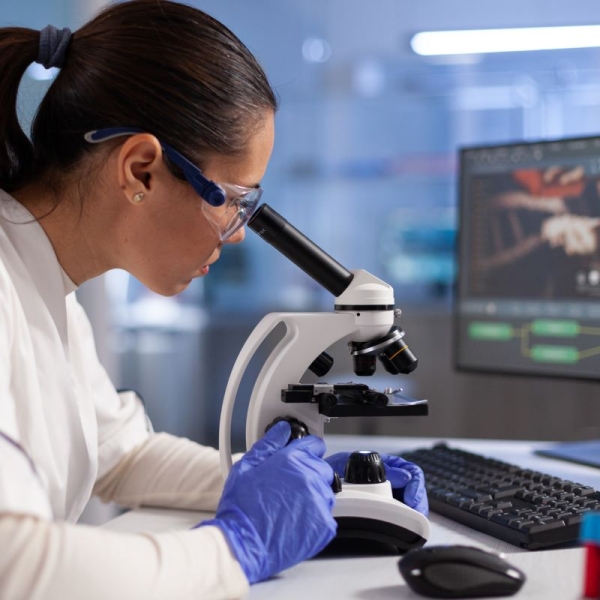10 Sep 2024 — Researchers project that one of three pioneer bacteria that dominate the gut microbiome of newborn babies has the potential to develop personalized infant therapeutic probiotics. Bifidobacterium breve was genetically adapted to use the nutrients found in breastmilk entirely and can block potentially damaging pathogens from colonizing a baby’s gut.
Three pioneer bacteria — the first organisms to colonize a new environment — drive gut microbiota in infant microbiome profiles: B. breve, B. longum subsp. longum and Enterococcus faecalis.
Both Bifidobacterium species are beneficial as they promote the stable colonization of other beneficial microbes. The researchers consider E. faecalis “risky,” as gut microbiomes dominated by this strain can lead to the colonization of antibiotic-resistant bacteria, which can interfere with the development of the infant microbiome and increase the risk of pathogens colonizing the gut.
Although B. longum is transferred to newborns from the mother’s gut during childbirth, B. breve was not transmitted in this way. The researchers also determined that this bacterium can block pathogens from colonizing the gut, highlighting its potential as a natural probiotic.
“The development of the microbiome at the beginning of a person’s life could have huge implications for them later on. It is also a time when the use of infant probiotics could be highly effective if we know what bacteria are both important and relevant to the target populations,” details senior author Dr. Trevor Lawley from the Wellcome Sanger Institute, UK.
“Our study highlights a hugely beneficial pioneer bacterium that can fully digest breast milk and protect the newborn against harmful microbes. This has the potential to be a highly effective natural probiotic as it can already establish itself in the child’s gut, and I hope that our open-access study encourages the rational selection of probiotic strains and development of novel microbiome-based therapeutics built on genomic research.”

The researchers found that B. breve can block pathogens, highlighting its potential as a natural probiotic.Baby Biome Study
The research team analyzed 2,387 stool samples from 1,288 healthy infants under one month old and some of their mothers using whole genome sequencing. The team accessed the samples through the UK Baby Biome Study, which the Wellcome Trust funds. The outcomes are published in Nature Microbiology.
This large-scale UK birth cohort study and biobank with follow-up aims to understand the influence on later health and disease of interactions between microorganisms, the immune system and clinical, social and behavioral factors during pregnancy and early life.
The team found that all newborns fell into one of three microbiome profiles characterized by a different dominant pioneer bacterium. Around 85% of the babies in the study were breastfed in the first weeks of their life. However, researchers discovered that breastfeeding or formula feeding did not seem to influence the type of pioneer bacteria in a baby’s gut, but antibiotics did.
Other factors, such as maternal age and how often someone has given birth, may also play a role. However, the researchers point out that further research is needed to investigate this and its impact on long-term health outcomes.
In addition, earlier research from the UK Baby Biome Study showed that babies born by vaginal birth had a different microbiome than those born via cesarean. However, another research indicates that breastfeeding and formula significantly impact an infant’s microbiome.
“If we think of a newborn baby’s gut as an ecosystem that starts to establish right from birth, there was very little known about which and how microbes plant the very first seeds to establish themselves before the findings of the UK Baby Biome Study,” explains the study’s first author Dr. Yan Shao from the Wellcome Sanger Institute, UK.
“By analyzing the high-resolution genomic information from over 1,200 babies, we have identified three pioneer bacteria that drive the development of the gut microbiota, allowing us to group them into infant microbiome profiles. Seeing the make-up of these ecosystems and how they differ is the first step in developing effective personalized interventions to help support a healthy microbiome.”

The first month after birth is the earliest window for interventions with probiotics that could restore or boost the microbiome.Personalized probiotics
The researchers note that their findings can support the development of infant formulas and therapeutic probiotics that contain the most effective natural strains for a baby’s gut. They highlight that most commercial infant probiotics contain a different bacterial strain — Bifidobacterium longum subsp. infantis — which they note is not considered a pioneer bacterium.
Additionally, B. infantis is not found in the early microbiomes of infants in countries such as the UK and the US. The researchers detail that this finding is aligned with research from other Western industrialized countries that show a lack of naturally occurring B. infantis in early infant microbiomes, suggesting that B. breve could be a more effective natural probiotic.
An infant’s gut microbiome begins to form at birth, with the first month the earliest window for intervention with probiotics that could restore or boost the microbiome. However, the researchers point to insufficient high-resolution data on microbiome development before the study and which bacteria would be most useful in healthy newborns.
“While our study has shortlisted three pioneer bacteria as important for babies’ microbiome development, it remains to be determined if and how different pioneer bacteria affect health and diseases, both in childhood and later in life,” says professor Nigel Field from the University College London, UK, and co-author of the study.
“The UK Baby Biome Study is actively following up with participants to give clues about this, and now even bigger cohorts are needed to investigate the role of the infant microbiome on health.”
By Jolanda van Hal

